#from a narrative or framing perspective
Explore tagged Tumblr posts
Text
more salty commentary about.... salty fandom commentary, but for a fandom i'm not really involved with
ftr this is about the gay-ass (affectionate) vampire show
squinting at some of super vitriolic anti-armand commentary that tumblr's algorithm keeps throwing at me like 'this? you want this one bestie? no? what about this one instead?' when in fact i want none of these takes, actually. "i don't believe a word that comes out of that lying liar's mouth!!" "of course he could have stopped claudia and madeleine's murders, he's the most powerful vampire in the world!!" (uh, i'll come back to that one later. maybe. if i feel like it) "he was onboard the 'let's murder claudia!' train from the very beginning!!!" etc. if you're even peripherally keeping your finger on the pulse of this fandom's discourse, you've probably seen some of this, too.
and... okay. bearing in mind two things:
it's been about 20+ years since i read the original novels, and
the show's relationship to the original novels, as well as the 1994 movie, is both conversational and subversive,
two seasons into this delicious mess, how are we still collectively failing to recognize that the central conceit of amc's retelling is that, intentional or not, all recollection of louis' past is both catharsis (for louis) and performance (for ???)? that all of louis' recollection of his own actions, as well as the actions of the other vampires in his orbit, is filtered through the lens of his own feelings about those vampires in that moment? like this isn't a subtle storytelling device, this is something the show is repeatedly bashing us over the head with again and again and again: louis' reliability as a narrator of his own experiences can't be trusted even when he isn't so consumed with rage that he tries to drain twenty year old daniel molloy dry for the unforgivable crime of /checks my notes, mouthing off at him like a dumbass, or goes into vulgar detail describing to lestat precisely how he is going to kill him, cut his head off, and then feed his decapitated head to lions at the zoo. which, it bears mentioning, is not the version of events that we were presented with during s1, but it is the version of events that louis himself comes to reluctantly believe is the more accurate recollection of the past.
does that make lestat into The Real Victim™️ who did nothing wrong to louis or claudia, ever? please tell me you're not actually asking me this question. be serious.
the point is that louis is right in the thick of feeling his intensely passionate vampire feelings about armand in real time, in the present day, while looking backwards through time at the 77 years they have spent together, and he is questioning everything. justifiably so, for the record! why wouldn't he question the actions and motivations of the supposed love of his life after discovering that such an important memory from his and daniel molloy's shared past was erased from his mind? but seriously, if you have reached this point in the story and your takeaway from the last episode boils down to "THIS TIME louis' recollection of the past is definitely 100% accurate! the rose-tinted glasses are OFF and we can see the TRUTH about you now armand!!!" then i just. i don't know what to say to you. lmfao.
anyway rather than getting into the weeds with anyone actually in the fandom about which of these diva vampire daddies is right, actually, find me hanging out with claudia and madeleine's ashes giving all of them the proverbial finger. because honestly, fuck all these vampires (affectionate).
#ray.txt#gay-ass vampire show#not dropping this one in the tags either. nope.#tl;dr louis is an unreliable narrator about EVERYONE. including armand!! including the bad things!!!#coming back this to edit and add:#i find it very interesting and telling that armand has been. rather quiet. during the last couple of episodes#i'm going to revisit and rewatch them to take some notes but i don't think this is accidental#from a narrative or framing perspective#this isn't to say he's been totally silent just to be clear. just in case someone decides to interpret that too literally#but i have been thinking about and mulling over something armand said in s1#when he was still pretending to be rashid#to paraphrase i think he said something like#'you're chronicling a suicide mr. molloy'#i think there are layers of meaning and motivation at work behind that statement
22 notes
·
View notes
Text
"the fault, dear Brutus -" (Julius Caesar)



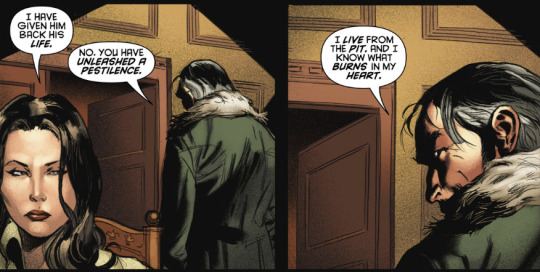












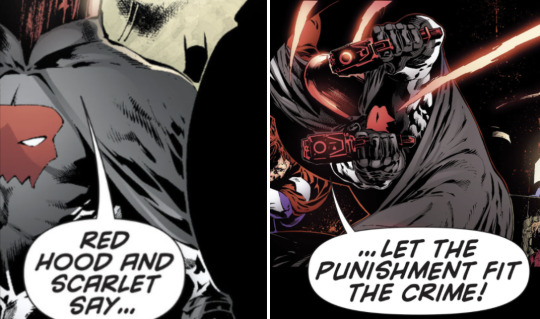

Quotes from A Critical History of English Literature by David Daiches. Panels from Death in the Family, Under the Red Hood, Lost Days, and Batman and Robin.
#OKAY SO i have been thinking about the hamlet post since i reblogged it the other day so i had to find panels to fit it#anyway i don't post about him much BUT#i do find jason fascinating both in terms of the Nonstop Emotional Intensity but also because on a narrative level#this is hard to articulate and possibly you need access to my dartboard of string in order to understand but#at some moments it's almost structurally as if you took the hero of a classic tragedy#and you put him in a story where he's the villain#it's like. what if hamlet but the story was told from the point of view of laertes#what if antigone but our pov character was ismene#you take the epic greek tragedy-esque stage and the tragic dramatic hero outraged at a terrible crime and the pile of bodies#and like. all of that is still true!! he really did get murdered!! it was really bad!! it's legit that he is mad about it!!#but then you frame it all from the perspective of the people going#'you just killed my dad and drove my sister to suicide you jackass'#and!!! they're not wrong either!!#and just ahhhh the way you can do that perspective-flip is just endlessly fascinating to me#web weaving#my comic art but we are using the term ''art'' loosely
130 notes
·
View notes
Text
If you are fine with the fact that the writers had Penelope doing a last minute, zero build-up, half-assed rebrand in order to remain Lady Whistledown (that can’t even logically function with her going public) i.e. her harmful coping mechanism instead of realizing she doesn’t need it anymore…
Sorry, but you don’t actually like Penelope. 🤷♀️
#penelope featherington#polin#bridgerton#this season was Lady Whistledown’s season#not Colin’s#not POLIN’S#and from a character growth perspective not even Penelope’s#my darling’s got shafted for a cheap narrative framing tool#my complex messy female main character became a girlboss stereotype#my sweet sensitive male romantic lead became a footnote and a sacrifice in his own love story#book Penelope is fuming#‘and we shall dance on the day of her demise’ ended meaning nothing huh
24 notes
·
View notes
Text
Izzy wanting to save Ed from Stede's incompetence so badly that he works with the English temporarily vs Ed wanting to save Stede from his own incompetence so badly he decides to work for the English indefinitely
#but only one of these is bad bc the narrative is told from Stede's perspective and frames it that way#but fr the fact that people can't see that both of these decisions are motivated by love is baffling to me#edizzy#izzy hands#edward teach#blackbonnet#stede bonnet#our flag means death#ofmd
66 notes
·
View notes
Note
I’m the anon from the post before and I understand what you mean! I guess I just took differently when I watched the show. I don’t think Charlie or Nick was upset about Ben being closeted I think they (especially Charlie) we’re just upset how Ben treated Charlie the entire. Also I’m not saying this to be rude or start anything this is just how I saw it:) I think Charlie was angry (as he should) about how Ben treated him through out the relationship they had and not about him being closeted. Because I do believe if Ben just communicated better and treated him better and didn’t treat Charlie the way he did it could’ve worked out. I’m just saying that I didn’t see them bashing Ben for being closeted only bashing him for treating Charlie the way he did without acknowledging how it felt for him.
Yeah I don't think Charlie or Nick is mad about Ben being closeted but weirdly I think the narrative is and that's what irks me. All his issues and bad behaviors are because he's closeted (you said yourself that it's because he's closeted that he treats Charlie the way he does) but the story doesn't seem interested in exploring that so much as punishing him for it by having both Imogen and Charlie yell at him and then throwing him out of the series before he can improve at all.
And when this show is so renowned for it's love and celebration of queer experiences and identity it will always feel out of place that Ben was left out in the dust seemingly because he and his experiences were too complex.
#ben hope#heartstopper#sorry if you really like the show but I am absolutely not the only one that found the handling of Ben uncomfortable#especially when the character is so so young literally the same age as Nick#to deny him the chance to grow feels wrong to me and a lot of other gay men who didn't have our shit together by 16#like this kid hasn't even taken his GSCE's which I assume are similar to the SATs or the Baccalauréat!#he needs to be given the opportunity to grow and he essentially gets the door shut in his face when he's trying to apologize#and to add to it Charlie gets that 'ambush me into accepting your apology' line that once again frames his own growth as a manipulation#which is FUCKED UP!#and from a writing perspective portrays the hand of the author pointing and screaming Hate This Boy Hate Him Hate Him#and the hand of the author should not be that obvious#it makes it feel disingenuous and as if Ben is just a stand in for someone who treated the author poorly#again this is all from a narrative perspective not a character perspective I want to make that clear because I see gay mutuals being lit up#by people who think Charlie should have been forced to forgive Ben or something#but thats not at all the argument any of us are making here
32 notes
·
View notes
Text
Just started watching hannibal and i dont see what this guy is doing wrong. as far as i can tell he's just a gay man who loves to cook fancy meals for his friends
#Im enjoying it so far suprisingly! Im not big on crime shows usually bc all of the#A) intense copaganda#B) repetitive/boring narratives#C) graphic & often fetishistic depictions of violent crimes against women#And i mean hannibal does hit A and C-ish but the story is sooo so fascinating esp the dynamic btwn hannibal/will/abigail#They are sick and twisted#Will is interesting autistic rep as well im glad they leaned into the hyperempathy thing bc that shit SUCKS#and no one ever talks about it bc if you call yourself highly empathetic you sound like such an asshole.#but like it can genuinely be dangerous esp. for women bc it makes us more trusting & therefore more vulnerable to manipulation/abuse#I don't know how to judge the copaganda yet since ive only watched s1. So far its like.#The fbi is generally accepted as a force of good. criminals are all those regular people! And the fbi agents lock the bad guys up!#We'll add a throwaway line abt how law enforcement are among the most likely to be serial killers#And we'll have one of our FBI agents be framed for murder#but dont worry hes still one of the good guys. He works for the fbi how could he not be?!#Im oversimplifying things ofc. the characters are portrayed as flawed human beings and thus the bureau is shown to make mistakes#But as of right now the show had not explored the systemic issues w/ law enforcement#I hope this will change bc i think that would elevate the story so much#And from where I'm at in the story there's definitely a way for the story to move forward with this perspective (mostly with will's arc)#But this is american network television so. i have my doubts#Regardless it is super interesting to analyze this show (if you could not tell by my tag essay that barely scratches the surface)#lots to chew on for sure#<- im sorry i couldnt resist#hannibal
4 notes
·
View notes
Text
i get why people would take this perspective since at the time everyone thought it was The End Of Adventure Time Forever And This Is Where Everyone’s Stories End. Forever but in retrospect its kind of so funny that after CAWM there were ppl like….. “wtf so now simons just Cured just like that and now he’s just normal :/“ Why would you think that, though. not having curse induced insanity anymore isn’t gonna change the fact that he survived a nuclear apocalypse. his last lines of dialogue in adventure time are him on the ground sobbing over betty
#some ppl missed the fact that betty Doing That in the finale wasnt supposed to be like#some super nice ‘her noble self sacrifice :)’ Happy Ending ?????#Consistently up to this point her efforts to get simon back r framed as like….. the wrong thing. to do#shes doing things that are ethically questionable at best shes making things worse for other people#and after refusing to give up even tho a very big point is made of the fact that this is not healthy#all she gets for her efforts is this sad fucked up imitstion of her plan#where neither of them gets what they actually wanted (to be together)#No betty sacrificing herself to save everyone from the problem SHE CAUSED isntframed as some nice good thing#and no simon was never going to just be normal and mentally healthy after everything that has happened in his life.#basilposting#atposting#There r valid interesting discussions of ‘was stuff that happened in CAWM right narratively’#but some ppl are approaching it from kind of a faulty perspective#and also its no longer. the end of the simon story arc. so its gonna kinda get recontextualized anyway#shifted around as it becomes the middle of a story instead of the end of it#basically huge L to whatever video the ‘she would rather kill herself than live with a mentally ill version of you’ clip is from#bc it turns out there is no version of simon that is not mentally ill <3
5 notes
·
View notes
Text
My boyfriend has really vivid, elaborate dreams. He’ll often wake up and talk about some grand narrative- travel, exploration, politics, performances. I’ve always been a little jealous, he can hold really good plots together for them sometimes.
But anyway, this does have a downside; vivid, elaborate dreams make for vivid, elaborate nightmares. I can usually tell when it’s one of those nights, since he grinds his teeth pretty badly.
I was never quite sure what to do when I knew he was having a bad time of it, though the grinding alone was enough to worry me and push me towards intervening. I used to just shake him gently, hope to rouse him just enough to reset the dream or something, but it wasn’t too effective and anyway waking him up all the time isn’t good for rest.
I’m rather proud of the strategy I eventually settled on: gently, so as not to wake him up, I’d lay one arm across his hands, wrapping his fingers around me so that he was holding on. Nightmares being nightmares, I can usually count on a pretty tight grip when this happens.
It may seem a little odd, but consider that holding on to something with both hands is typically a very agentic frame of mind. We hold on to things that give us power, in one way or another, and possessing objects often makes us feel powerful in some respects. That has consequences, even for a dreaming mind.
I knew it was working when he woke up rather mystified from one such dream, and told me that he’d been running through the caverns of some dungeon or cave system, pursued by monsters, but then all of a sudden he was holding a giant anime sword and fought them off instead. So I got to be a sword for him that night, I was delighted.
I don’t usually get to know exactly what happened, since even for a very vivid dreamer like Ritter, nine tenths of these things get forgotten. But I know I’ve been things like door handles, steering wheels, stuff like that. And even when I don’t know what I am to him, he doesn’t grind his teeth nearly as much- the sleep is deeper and more peaceful, so I get plenty of feedback that it’s working.
It’s such a perfect encapsulation of love in microcosm, isn’t it? No matter how much you mean to them, and how much they mean to you, the gap between two conscious lives is fundamentally separating you. But fundamental does not mean insurmountable. There’s this whole world in him, full of dreams and perspectives that I’ll never truly experience. But I will be a part of those worlds all the same, finding little ways here and there to make sure that the dreams of me make him a better, stronger, and happier person.
Or at least, so one hopes. It’s a difficult challenge, and things often go awry. But usually you get at least a little lucky.
7K notes
·
View notes
Text
i think about this a lot. because the thing is, i don’t think either of them are truly to blame for the seals they broke. dean was tortured into submission and had no idea that there could be such massive consequences to giving in; sam was manipulated and deceived and honestly thought what he was doing would stop the apocalypse, not set it in stone. neither of them willingly chose to break a seal, and neither of them had any way of knowing what they were really doing. they were key pawns in a game they didn’t even realize was being played, not active participants in it. and i don’t think you can really blame someone for falling victim to that.
but if you are going to blame sam for his part in it, you also have to blame dean for his. either both of them are responsible for accidentally breaking the most important seals, or neither of them are.
didn't...didn't dean break the first seal? why is everyone on sam's case for being manipulated into killing lilith (which he thought was a good thing bc hey demon dead) but not on dean's case for torturing souls and LIKING it? protect sam winchester oml
#this plays into a lot of thoughts i have about their roles in the show#the way i see it sam is the protagonist from a plot perspective (at least at first)#but the narrative lives in dean’s head. the show is filtered through the lens of how he sees things#and the way the show just…forgets about dean’s role in breaking a seal once sam does the same#mirror’s dean’s tendency to latch onto other people’s wrongdoings to escape the guilt he feels about his own#if the story is told through dean’s eyes then of course sam is the only one we’re told to blame in the end#because dean himself is trying desperately to not think about what he did#and projecting those feelings onto sam is the only way he really knows how to do that#but just like dean never really believes it — guilt doesn’t go away just because you repress it and he still winds up hating himself#the show also never really believes it and that’s why the absence of blame placed on dean is so glaring if you’re paying attention#it feels wrong because it is wrong. we know that because the show knows that because dean knows that#but dean can’t admit it so the show can’t admit it#and that makes it easy to ignore. easy to not pay attention to. easy to just pay attention to sam instead#ofc i don’t think they did any of that on purpose#but it’s unintentionally a really interesting framing that exists throughout the entire show#not to mention sam being the plot protagonist also makes sense if the narrative lives in dean’s head#because sam is the most important character in dean’s life#and just like being a protagonist often means you pay for the spotlight by going through the most horrors#sam’s role as the most important person to dean often just causes him more pain#so yeah. in my mind sam is the main character of the story but dean is the one telling it#which actually also puts an interesting spin on the ending post-dean death#that sam’s life montage is all weird and blurry because it’s not real at all#it’s what dean imagines — maybe hopes — sam will have after he’s gone#the nice happy future for sam that he has to believe in so he can let go#ANYWAY i’ll shut up now. this show is eating my brain#spn posting
151 notes
·
View notes
Note
your tags. yeah. it's not that they are progressive or feminist or even written by women -- but they are doing something with women that is complex and worth paying attention to, and in many cases they are the reason we have a version of a particular woman's story at all
yeah that's one of the marketing conceits of the myth retelling novel industrial complex that bothers me, it's the framing as if no one has ever paid attention to these female characters who are buried unnoticed in the myths when often the most complete or the most authoritative version of the character's story that survives from antiquity is in tragedy, a genre that is notoriously interested in bringing female characters out of the house and putting them on stage in active roles, and in using those female characters to explore issues of gender and the place of women in contemporary society.
like to a certain degree it makes sense for the homeric women who don't appear in (extant) tragedy, like briseis or the hanged women in odyssey 22, but we have stories where clytemnestra and deianira and medea insist on make narrative space for themselves to tell their own stories from their own perspectives, refusing to be silent about the violence their society inflicts upon women and the lasting damage it does. they're called aeschylus' agamemnon and sophocles' trachiniae and euripides' medea. and maybe you want to retell those stories for modern audiences, changing things or emphasizing different aspects of them! and that's great! but framing it as if they've been ignored and their stories are as-yet-untold is just not accurate, and it's a cheap way to paint your work as innovative and subversive.
#interestingly the exception is medusa. who really is never given her own voice in antiquity *because she's never imagined as a person*#so like. the same way there nobody in antiquity wanted to look at the labors of heracles from the perspective of the hydra.#but (following ovid) modern reception tends to understand medusa as a person with interiority and her own perspective#in a way that i dont think would have made sense to anyone in archaic or classical greece#and medusa is often put into this category of 'misunderstood women' for the purposes of retellings#mine#ask#wizardysseus#retellings#reception
864 notes
·
View notes
Text
“I told you, Joyce has this telemarketer job. She’s always on the phone. Mike won’t stop whining about it.”
I know it’s been talked about before, how notable it is that, apparently, Mike won’t stop whining about the Byers’ phone line always being busy. But I think, more than just narratively, it’s very notable from a writing perspective.
Because who’s saying this? Dustin. Dustin, one of Will’s best friends. Dustin, who could have framed it as, “She’s always on the phone. I can never get through to talk to Will.” and no one in the audience would think twice. Or they could’ve written it where Dustin says, “She’s always on the phone,” and then Lucas is the one who adds, “Yeah, I can never get through to talk with Will.” and again, no one in the audience would bat an eye. Because it would be completely normal for either of those two to have tried to call Will.
Yet they specifically chose to write it so that not only is Mike the one we learn calls the Byers house frequently, but he also won’t stop complaining about it.
Oh, I love some intentionally well-placed bread crumbs<3
797 notes
·
View notes
Text
The Theraprism: Good or bad?
Ya know, i've never been sure how to feel on the Theraprism, as shown in the Book of Bill. This is in large part because we get very little info on it, from any perspective other then BIll's own at least (and he is...Not a reliable narrator). Personally, I see three possible interpretations and I don't know which one is correct. To be clear, I think all of these are fairly valid: 1. Their methods seem insipid, but are actually quite effective. They seem to have been effective in the past (one of Bill's fellow patients is slated for release in the near-future apparently), and the Axolotl (who, while not exactly rich characterization himself, has, generally, been portrayed as wise and benevolent) referred to it as "what [Bill] needs the most", which would be weird if it doesn't have SOME merit. I, myself, honestly prefer this one, because I think it works better with the narrative of the Book of Bill (a book which, generally, does not encourage the reader to sympathize with Bill's plight. Pity, maybe, but the framing is very clearly that he kinda deserves this) and the schadenfreude the reader is encouraged to feel if Bill's hellish afterlife is, largely if not entirely, a self-inflicted one: That it wouldn't be particularly bad if not for his own combo of being unable to accept that he lost, that he shouldn't be allowed to do whatever he wants whenever he wants to anyone he wants, inability to form meaningful bonds with others, and, most of all, his total inability to admit to being wrong. He COULD leave at any time, if he would just actually repent, but...He's Bill, so...He won't. It just works best for me if his hell is largely self-inflicted. 2. They are harmful, possibly deliberately. This does have a fair bit of support textually. Mandatory therapy is already a pretty major ethical grey area at best (a major tenant of modern psychotherapy is that you can't make someone change unless they take the first step), they definitely engage in toxic positivity, and, of course, the "Solitary Wellness Void" is...Solitary confinement, which is a practice most modern medical institutions oppose and consider to be psychological torture. So, fair bit of support for this. 3. This is what I think was probably Alex's intent: They're a bunch of oblivious obnoxiously happy morons (as Bill himself would probably describe them) whose attempts to treat eons-old eldritch horror bad guys with puppet shows and arts and crafts is meant to be amusingly-inept rather then actively malicious, and whose effectiveness (such as it is) is down to having literally eternity to try. Kinda like what Mabel might do to rehabilitate someone. To use an analogy, think Charlie Morningstar from Hazbin, at least in the first couple episodes, where the fact that she's treating adult criminals like misbehaving children is the joke and is meant to indicate incompetence rather than malice. I get that isn't that much different from the proceeding (except in terms of "how seriously are we supposed to take this"), but still. I think all three of these have support, and, to be clear, I go with the first one not because I think it's the most supported (might be the least), but because it jives most with how I think about BIll's narrative IE as a character we're meant to, at best, pity, but not really sympathize with. I think the intent is "Bill is suffering a karmic self-inflicted punishment after all the pain and suffering he's caused", not "Bill is being medically abused and we should feel bad for him". The Book of Bill does invite readers to sympathize with Bill occasionally, but mostly past Bill, not current Bill. All viewpoints are valid, this is just trying to organized some thoughts on the subject. I sincerely hope I haven't said anything harmful here. Uh, cards on the table, I am neurodivergent, but i've never had therapy, forcefully or otherwise (although I did have an irrational fear of the possibility of institutionalization for a bit), so i'm sorta going off vibes here, sorry to say. If I said anything insensitive here, I apologize.
411 notes
·
View notes
Note
tbh I don't know why everyone is so surprised that Riddle didn't pick Trey to be his Vice. I always thought that idea was contradictory to the version of Riddle that we see leading up to his overblot.
[You can see my thoughts on the book 7 chapter 12 part 2 update here!]


To quickly explain for those who don’t know: the recent update informed us that Trey was voted by his dormitory peers into the vice dorm leader position. He was not, in fact, hand selected by the newly appointed dorm leader Riddle.
I don’t really blame people for being surprised. Based on the presentation of Riddle and Trey in book 1 and what we knew prior about how vice dorm leaders are picked, the lore we learn in book 7 almost feels like it’s trying to convince us of another narrative historical revisionism, ayo/j. Let me try to explain what I mean.
Firstly, we have to remember that we spent a lot of book 1 with Trey, not with Riddle. We had lunch with Trey, we made a chestnut tart with Trey, we confronted Trey in the library, and we fought OB Riddle with Trey. We also see the camera cutting away to multiple instances of Trey trying to smooth things over with Riddle. And Trey is the one with warmth and fondness for his relationship with Riddle. Because we spend all this time with Trey (who is still attached to Riddle) versus Riddle (who is supposedly distant and detached), we get the impression that the two are closer than they truly are prior to Riddle’s OB. This impression is further strengthened by the presence of Chenya, another friend who paints their shared childhood in a largely positive light.
If you pay attention to how Riddle speaks to Trey throughout book 1 (pre-OB), Riddle does not speak warmly at all. He is usually speaking from the position of a ruler to his second-in-command and much of his dialogue with Trey is him commanding Trey to do X or Y. There’s no reminiscing about old times, no Riddle lording their childhood friendship to guilt Trey into falling in line, no leniency with Trey, nothing that would imply a connection beyond a professional one. Riddle basically treats Trey the same as Cater, his other third year minion at the time—and Riddle isn’t close with Cater at all. The one major exception I would say is right before Riddle OBs, in which he demands if Trey is also betraying him. Again, because we have spent so much time with Trey, we see Riddle from his perspective. We are more likely to view Riddle’s demand as him being hurt that his childhood friend is turning on him versus viewing Riddle’s demand as being hurt that his right-hand man who has been following his orders right up until now refuses to obey.
Really, it feels like less of an issue of fans not picking up on Riddle and Trey being alienated in early book 1 and more of an issue of how book 1 is framed. So much of it is colored by Trey’s (ironically) rose-colored lenses, so we as the viewers who are exposed to it are far more likely to see their friendship as persisting and Riddle having a soft spot for Trey as well. (Riddle is more patient later in the main story too, Granted that book 1 was so long ago, fans may remember the more patient and empathetic post-book 1 Riddle and may judge him based on that metric rather than the book 1 metric.)
Another major aspect as to why people are surprised that Riddle didn’t personally pick Trey as his vice dorm leader is because we literally didn’t know about any other methods to become vice dorm leader??? 😭 Like. I’m pretty sure that the only method we knew of before was to be picked by the dorm leader. I guess people noticed Riddle and Trey were childhood friends and assumed Riddle picked Trey because of familiarity? This is also the case with several other dorm leader/vice dorm leader duos, so this conclusion isn’t based on nothing.
Trey doesn’t strike a lot of us as a particularly… ambitious person?? He often expresses that he doesn’t like getting involved in conflicts or when people cause problems for him, which would be common occurrences for someone in a position of power like the vice dorm leader seat. You’d think Trey would actively want to avoid those responsibilities. Most of us probably didn’t think he would accept the position of vice dorm leader unless the person picking him for it is someone he cares about and/or feels like he has to support—which Riddle is. A ton of his behaviors in book 1 supports this, from doing Riddle’s dirty work and sharing that he harbors guilt over the past + struggles to speak against Riddle because of that.
Book 7 tells us what was technically true of Riddle’s perspective and treatment of Trey early in book 1. We just failed to see it before because of the lack of information and overwhelming bias at the time.
#twisted wonderland#twst#disney twisted wonderland#disney twst#book 1 spoilers#Riddle Rosehearts#Trey Clover#Cater Diamond#Chenya#Che’nya#notes from the writing raven#book 7 chapter 12 part 2 spoilers#jp spoilers
195 notes
·
View notes
Note
Was having a conversation with a friend about Old League lore. It got me curious, is Garens character still basically analogous to a genocide general, what with the mage hunt and all that, or has that largely been retconned away? I'm as familiar with league lore as I used to be.
It's more or less as it was. Mageseeker and the Lux comic have attempted to cast him as a reluctant soldier trying to resist bad orders to the best of his ability, but they haven't ever actually reckoned with any of his culpability and hypocrisy. It's one of those situations where the actions he is depicted as undertaking are astonishingly heinous when you think about them for even two seconds, but the story is invested in making sure you know that he personally feels very bad about doing it, and that in the name of nuance and fairness you should therefore be willing to be sympathetic with him.
Which. Y'know.
Asking us to hold sympathy for a guy who is dragging Extremely Obvious Metaphor For Queer People off to concentration, forced conversion and extermination camps is... I mean it was always a bit of an ask to make of a literate audience, but it's becoming ever more so as Current Year drags on.
idk I just don't have a lot of patience, in the present moment, for stories that try to leave heroic narrative space for people who hold pathetic loyalty to bad institutions, and commit atrocities in their name while shaking their head the whole time so everyone knows they mournfully disagree with what is currently being done, by them.
And if Garen was actually meant to be understood as some of the lowest scum of the earth: someone who knows better and does evil anyway, then that would make for an interesting story, but he's pretty consistently framed as a tragic figure doomed by his noble loyalty to a higher ideal, and oh don't you relate to his deep and complex struggle, such difficult moral questions he faces.
It feels telling of the audience that the story is written for, and the perspective it is written from.
186 notes
·
View notes
Text
The Chosen One's actions in Animator vs. Animation 11: A Mini Analysis
Recently, with the release of the latest Animator vs. Animation episode, I have seen many people begin to view Chosen's character in a more negative light. Now I can't lie and say that this episode doesn't exactly do him any favors, however I think people need to hold their horses a bit when it comes to assuming how he actually feels about the Newgrounds rampage.
First off, the big one, Mitsi's death. Chosen is framed to have been the one who killed her, and it's clear that Agent, and the narrative, believe it was him who did it. But if there's anything I've learned about red herrings, it's the fact that what seems like the obvious answer might not be so obvious after all. We don't actually know if Chosen was the one who killed her, all we see is a a flurry of fireballs raining from the sky, one of which hits Mitsi and completely incinerates her, then we see Chosen flying down from above. Considering that Dark is also shown to have flown in from above, it could've just as easily been him who killed her.
As a matter of fact, Dark would probably make more sense seeing as his most common form of attack is fireballs. Regardless of who did it or not, I do think it's important to remember that Chosen isn't the only culprit and that we shouldn't immediately assume it was him.
But let's say, for a moment, that Chosen was the one who did it, I still don't think that frames him in as negative of a light as the fandom portrays.
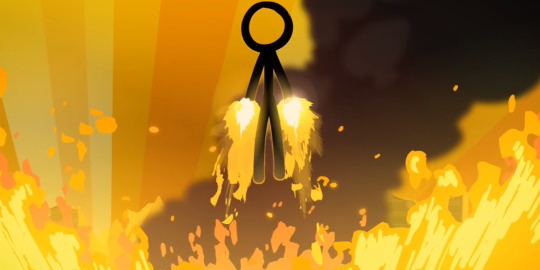
For starters I should say that we don't know how Chosen feels about what he has just done, at least not in this episode. However we see the exact same Newgrounds rampage from his perspective in Season 2, and there it's pretty clear that this is the point where he starts having second thoughts, and his body language in this episode actually reflects this.
When we first see him, Chosen is just sort of... calmly descending upon the destruction, there's no indication of what emotions he is feeling at this moment, but I honestly don't look at this and see "yeah, he definitely enjoys this"
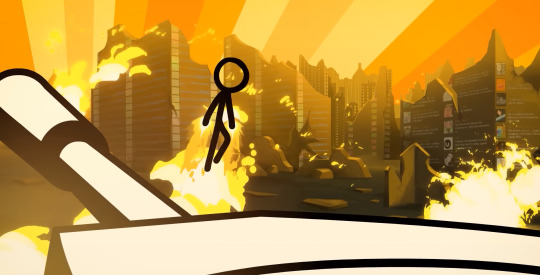
His movements are slow and non-aggressive, there's no real energy in his actions, no sign of pride or enjoyment, he just sort of flies over the the Newgrounds tank and lands on top of it. To me this doesn't come off as someone who is enjoying this, this is coming off as someone who is taking in all the destruction around him and simply trying to process it. It's not positive, nor is it negative.
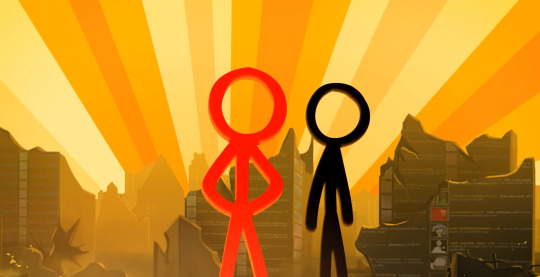
But I think the most telling thing about it is how his body language contrasts Dark, take a look at this shot. Notice anything?
For one, Dark is centered while Chosen is the one standing off to the side, portraying him as almost a secondary threat, a person standing alongside his much worse partner.
Moreso than this however, look at their poses. Dark has his hands on his hips, clearly taking pride in his much destruction he and Chosen have caused. Chosen by comparison is just sort of... standing there, there is no clear show of pride in his posture, as a matter of fact, this shot here almost reminds me of this one.
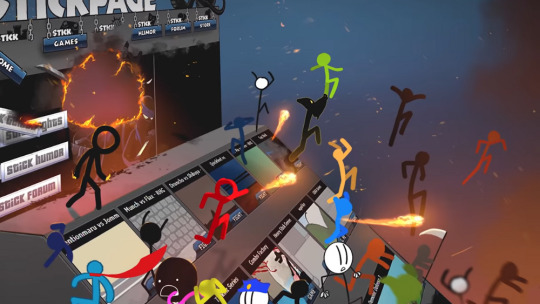
In both cases, Chosen is seen off to the side, staring down at the destruction while not showing any real emotion, and in this case, it was clearly trying to communicate that Chosen was not enjoying this as much as Dark was.
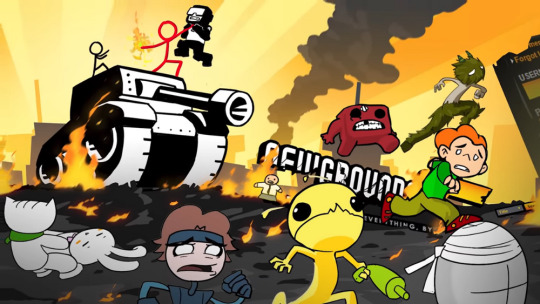
He's even seen seemingly pleading with Dark to stop what he is doing, and you wanna know something really interesting about this shot?
Chosen and Dark are both shown on top of a tank, just like we saw in AvA 11. I'm not saying this is the same scene, but I am saying that the parallels here are likely not meant to be a coincidence. In both cases Dark is clearly taking pride in the destruction, Chosen meanwhile looks a lot more unsure.
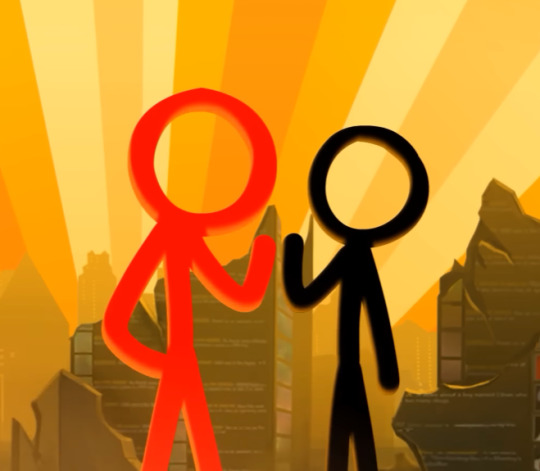
Now for the high-five scene. People have already pointed this out but Chosen almost seems to hesitate before giving Dark a high-five, as if he's unsure about it.
Another detail I also wanted to bring attention to is how Dark initiates the high-five. It may seem small at first until you remember that this isn't the first time we have seen such a gesture between the two characters.
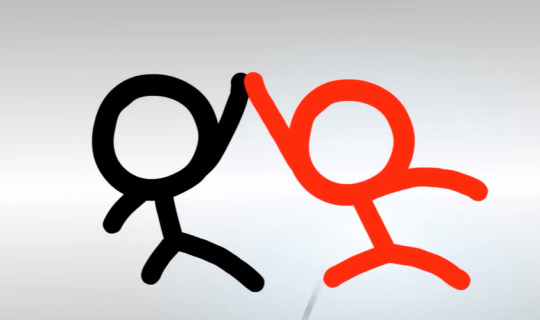
We all see this happen in The Flashback, and ya wanna know the interesting thing? Chosen was the one who initiated it. Keep in mind that the context of this seen was that Chosen finally escaped Alan's abuse and was clearly happy about it. It should also be worth noting that unlike Chosen, who took a few seconds to reciprocate the high-five in AvA 11, Dark does it almost instantly.
This is all to say, while this episode does not portray Chosen in the most favorable light, I don't think this is as simple as "he killed Mitsi and enjoyed it".
I want to make it clear that I do not think Chosen is innocent in this scenario, whether he enjoyed it or not, he still actively took part in this rampage, all I'm saying is that we don't really know Chosen's feelings during this moment or if he was even the one who killed Mitsi in the first place, and with how he was previously portrayed during this exact same rampage, I have more reason to believe that he didn't actually enjoy this at all. So before you raise your pitchforks and call Chosen the worst person ever, consider that maybe, there is more nuance to this story than first meets the eye.
232 notes
·
View notes
Text
wtf is dracula daily?
i’ve seen a couple people ask this question on my posts about it, so i thought i’d go ahead and clear it up here!
ok so, the classic horror novel “dracula” is an epistolary novel - that means it’s told via letters, diary entries, ship logs, and news articles. (technically the term “epistolary novel” refers to works told solely through letters or emails, but many have expanded it to mean any work that is told via in-universe documents, hence why diaries and logs often get included as well. “frankenstein” is another classic example; the whole framing device is robert walton is recounting the story he heard from victor to his sister via letter. a modern example would be “several people are typing,” which is told via slack messages, or “the perks of being a wallflower,” which is told via letters from charlie to his anonymous pen pal, which is functionally more like you’re reading his diary.)
because of the nature of the narrative, we actually know the exact day nearly everything in dracula happens - the letters, news articles, diary entries, etc. are all dated.
“dracula daily” is a substack project where the novel is broken up into parts, with people who are subscribed to the project getting emails every day something in dracula happens - for example, the novel opens with jonathan harker’s journal entry on may 3, so on may 3, subscribers are emailed that entry. the action of dracula takes place from may 3 - november 6, plus an epilogue set some years later. the project started in 2021 (i think), but fucking BLEW UP in 2022, and they’re doing it again this year! lots of us are very excited - especially people like me who fell behind last time.
why not just read the book?
valid! due to some parts of dracula being told out of chronological order, dracula daily does reorder some things. for example, the first section of dracula is told entirely from jonathan harker’s pov, then the second section switches the pov to mina murray. their sections have some overlap in the timeline, so dracula daily jumps back and forth between their perspectives.
if you want to read the book as bram stoker intended, dracula daily may not be for you. but for a lot of people (myself included!), it breaks up a very long text into easily digestible chunks (....mostly. there is one entry that is 10k words), and the fact that it’s a big project means there are a lot of people reading along with you.
i think there’s also something valuable about experience the slow revelation of wtf is going on along with the characters. the book which you might otherwise get through in a few days is stretched out into months of suspense and agony as you wait for the other shoe to drop, and it’s great.
plus, the whiplash between “jonathan harker’s neverending horror” vs “lucy is basically on the bachelorette” that you get in dracula daily is very very funny.
how do i sign up?
right here! and if you sign up and fall behind in the emails, no worries - the dracula daily website posts past entries so you can catch up.
what if i prefer audiobooks?
have i got great news for you!
like i mentioned before, i couldn’t keep up with the emails last year. part of it is that it is much easier for me to focus on an audiobook or keep up with a podcast than it is for me to sit down and read, especially with longer entries.
this year, there is going to be a podcast titled “re: dracula” that was inspired by dracula daily. every episode will be a dracula daily entry, with a full voice cast! (seriously, if you listen to british podcasts, you will recognize some of these names. the magnus archives and wooden overcoats girlies are WINNING.) you can find that here.
there is also a podcast called “cryptic canticles” that has an already-completed audiodrama of dracula that i’m told is also extremely good, and was also broken up by date. you can find that here.
why do i keep hearing about paprika/the boyfriend squad/lizard fashion/cowboys?
you’ll see.
oh god am i gonna hear about this nerd shit for the rest of the year
yes. sorry.
3K notes
·
View notes